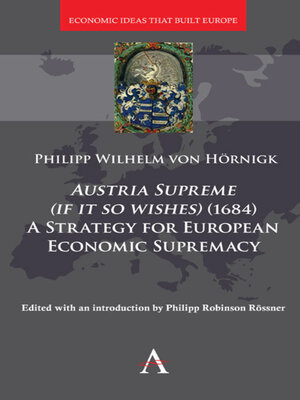Austria Supreme (if it so Wishes) (1684)
ebook ∣ 'A Strategy for European Economic Supremacy' · Economic Ideas That Built Europe
By Philipp Roessner

Sign up to save your library
With an OverDrive account, you can save your favorite libraries for at-a-glance information about availability. Find out more about OverDrive accounts.
Find this title in Libby, the library reading app by OverDrive.



Search for a digital library with this title
Title found at these libraries:
| Library Name | Distance |
|---|---|
| Loading... |
Austria Supreme (if it so wishes) (1684) provides a translation of and a scholarly introduction to the Austrian-German Mercantilist classic Oesterreich über Alles Wann es Nur Will (1684) by Philipp Wilhelm von Hörnigk. Published a few months after the unsuccessful 1683 siege of Vienna by the Turks, a turning point in European history, the book stayed in print for more than 100 years. This was the most widely read German language economic textbook of the period, containing, in a nutshell, the essential ingredients of economic strategy that would make Austria and Europe grow rich and eventually overtake the rest of the world as the first world region that experienced an industrial revolution. In Oesterreich über Alles Wann es Nur Will Hörnigk updates and redefines the Mercantilist political economy – a strategy for achieving national wealth and political strength simultaneously by building up a competitive domestic manufacturing industry with the help of the state. Austria Supreme (if it so wishes) (1684) is the first-ever English translation of a work whose importance for European economic development and the 'European Miracle' cannot be overestimated.
|Between its first date of publication in 1684 and 1784 classic 'Oesterreich über Alles Wann es Nur Will' went through more than twenty known editions which makes it, arguably, Europe's most successful 'economics textbook' prior to Adam Smith's 'Inquiry into the Nature and Causes of the Wealth of Nations' (1776). Philipp Wilhelm von Hörnigk laid in this book the foundations of what has become known as the 'mercantilist' political economy – a strategy for achieving national wealth and political strength simultaneously by building up a competitive domestic manufacturing industry with the help of the state. Hörnigk advocated standard recipes known from modern development economics, such as import substitution, protective tariffs on select goods as well as bounties and other financial as also logistic support by a proactive interventionist state in order to safeguard and nurture domestic industries that were in a state of infancy but which would be promising candidates for future growth and economies of scale. As new work by Erik Reinert and Lars Magnusson has shown, contrary to a sort of mainstream view in modern economics and economic history, it was such policies that tended to make European countries rich in the pre-industrial age, also laying the basic foundations for subsequent industrialization – even the 'Great Divergence' between Europe and Asia post 1800. Most European states were interventionist during the nineteenth century. They obviously drew upon a menu of recipes and...







